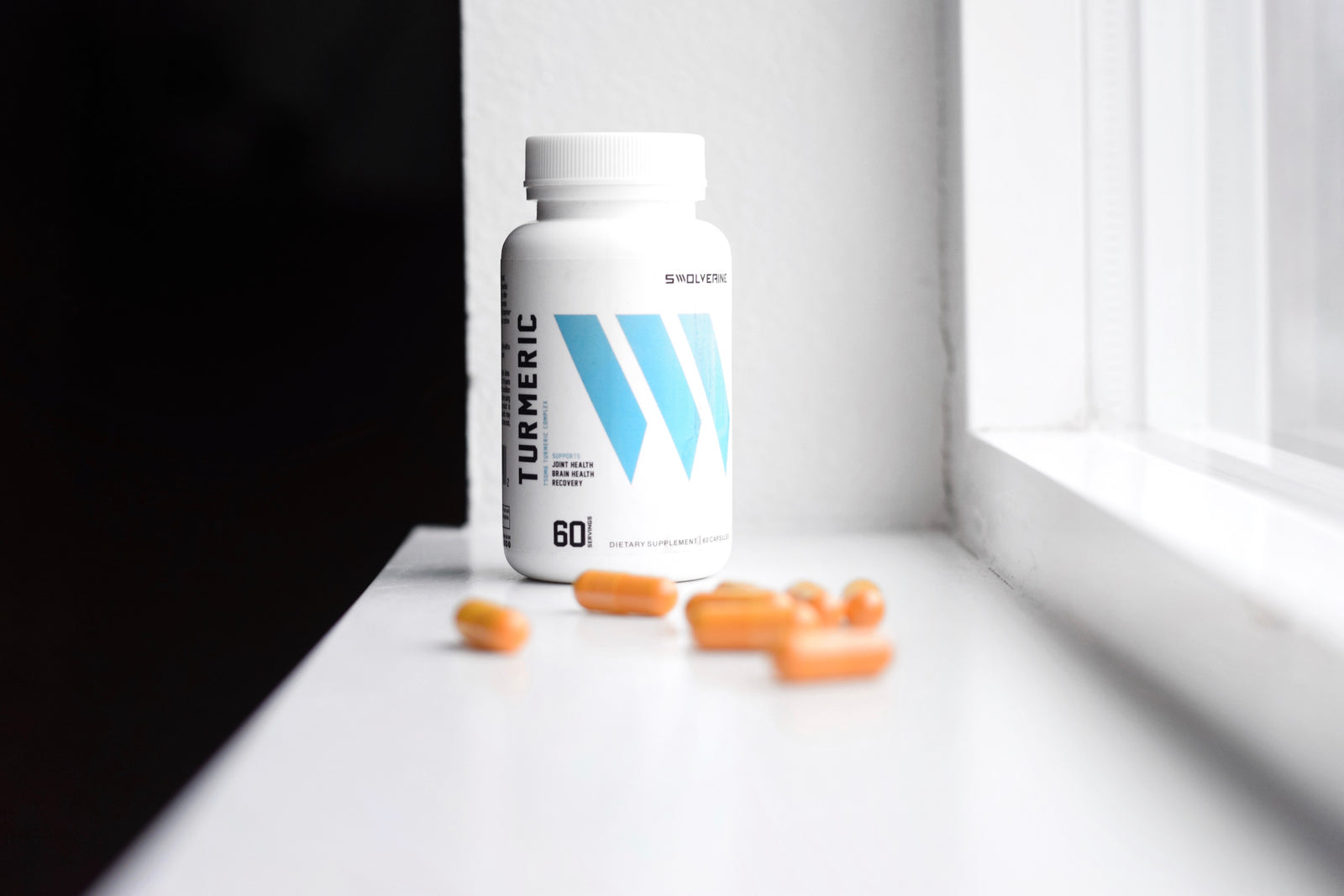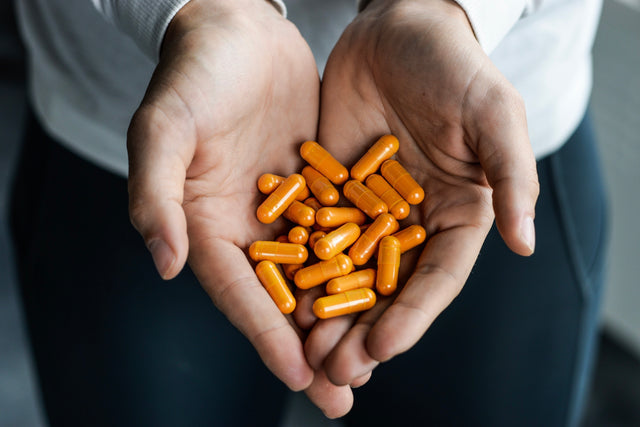Turmeric has become one of the most popular and effective supplements due to its powerful medicinal properties and health benefits. Research has shown that Curcumin, one of turmeric's many bioactive ingredients, is largely responsible for the anti-inflammatory and antioxidant effects of turmeric. So the question is which one is better turmeric or curcumin?
What Is Turmeric?
Turmeric is found in the root of Curcuma Longa, a flowering plant native to the ginger family. Turmeric has been used for its medicinal properties for centuries as an ayurvedic medicine, a form of traditional healing in Southeast Asia.
Turmeric contains three powerful plant compounds known as curcuminoids. These three compounds include
- Curcumin (or diferuloylmethane)
- Demethoxycurcumin
- Bisdemethoxycurcumin
Curcuminoids are polyphenols or natural antioxidants that occur in plants and contain profound health promoting effects. Antioxidants are found to reduce oxidative stress, which is believed to be one of the foremost mechanisms behind aging and chronic disease.Curcumin, the active ingredient found within turmeric, accounts for 2-8% of most turmeric preparations, and gives turmeric its distinct yellow and golden color.
RELATED ARTICLE The Ultimate Guide To Turmeric
Turmeric is also known as an adaptogen. Adaptogens produce a calming effect and balance stress, through neuroprotective mechanisms, anti-depression effects and boosting brain function.
RELATED ARTICLE The 6 Best Adaptogens To Help You Relieve Stress And Anxiety
What Is Curcumin?
Curcumin, a polyphenol is a bioactive ingredient found within Turmeric. Research has shown and attributed the antioxidant, anti-microbial, and anti-inflammatory properties of turmeric to curcumin and has been the topic of research in several different investigative studies as a potential option and treatment for diabetes, insulin sensitivity, digestive health, anti-cancer, osteoarthritis, and weight loss.
Turmeric Vs Curcumin: Similarities
Since curcumin is the active ingredient naturally found in turmeric, both turmeric and curcumin exhibit anti-inflammatory and medicinal properties. Turmeric, however, contains various plant compounds in addition to polyphenols, that curcumin does not such as volatile oils (tumerone, atlantone, and zingiberone), sugars, proteins, and resins.
Research suggests that both turmeric and curcumin may have a positive impact on reducing minor aches and pains and optimizing your recovery, while improving overall joint health.
RELATED ARTICLE 5 Health Benefits Of Turmeric For Athletes
Both Turmeric and Curcumin have been found to reduce joint pain by modulating the inflammatory response and inhibiting the production of inflammatory cytokines. This is especially beneficial to those athletes that participate in high impact or high-intensity functional training. Studies have also shown positive benefits on patients with knee osteoarthritis, inducing analgesic effects and improving quality of life.
RELATED ARTICLE Turmeric For Joint Pain: Does It Really Work?
Other investigative studies have shown that turmeric and curcumin help reduce levels of bad cholesterol, otherwise known as low-density lipoprotein (LDL) cholesterol — and triglycerides, which may help reduce your risk of heart disease [R].
Turmeric Vs Curcumin: Differences
But what about the differences? Do Turmeric vs curcumin have any significant differences, that make one better than the other? To date, there have only been few investigative studies which show any significant differences, which may be worth considering.
While curcumin has been proven to have powerful anti-inflammatory and antioxidant properties alone, turmeric does offer other plant compound which may prove beneficial to overall health.
One study conducted by the University of Texas showed that turmeric effectively blocked the proliferation of breast cancer cells more so than curcumin alone by an additional 33% [R].
Other studies show that while turmeric, and all eight of it’s plant components, including curcumin exhibited anti-fungal effects on their own, the effects were magnified when all eight were taken together [R].
Turmeric Vs Curcumin: Which One Is Better?
At this point, more research is needed to determine whether turmeric or curcumin is better for overall health. Since turmeric contains curcumin, along with other curcuminoids, polyphenols, and powerful plant compounds, opting for a turmeric supplement, will prove to be more beneficial than using a curcumin supplement alone. High-quality turmeric supplements, contain up to 95% curcuminoids as opposed to around 3% found in ground turmeric powder. By using a turmeric supplement such as Swolverine’s Turmeric, you’ll get a high concentration of curcumin along with other beneficial plant compounds and curcuminoids.
Looking for an amazing Turmeric Supplement to help you reduce inflammation?
SWOLVERINE IS AN ENDURANCE ATHLETE AND ACTIVE LIFESTYLE BRAND. MADE FOR THE ELITE ATHLETE, AND THE STRONG-WILLED OUR PRODUCTS WERE DESIGNED TO FUEL YOUR ATHLETIC PERFORMANCE. WE PERFORM WHEN YOU PERFORM.
We believe that everyone can optimize not only their athletic performance but their human potential. The way we believe we can optimize performance is through transparency, clinically effective doses, and clinically proven ingredients with evidence-based outcomes. We provide the nutrients you need to power your active lifestyle.
References
Zhang, Dong-Wei et al. “Curcumin and diabetes: a systematic review.” Evidence-based complementary and alternative medicine : eCAM vol. 2013 (2013): 636053. doi:10.1155/2013/636053
Qin, Si et al. “Efficacy and safety of turmeric and curcumin in lowering blood lipid levels in patients with cardiovascular risk factors: a meta-analysis of randomized controlled trials.” Nutrition journal vol. 16,1 68. 11 Oct. 2017, doi:10.1186/s12937-017-0293-y
Kim, Ji H et al. “Turmeric (Curcuma longa) inhibits inflammatory nuclear factor (NF)-κB and NF-κB-regulated gene products and induces death receptors leading to suppressed proliferation, induced chemosensitization, and suppressed osteoclastogenesis.” Molecular nutrition & food research vol. 56,3 (2012): 454-65. doi:10.1002/mnfr.201100270
Chen, Ciqiong et al. “Antifungal activity, main active components and mechanism of Curcuma longa extract against Fusarium graminearum.” PloS one vol. 13,3 e0194284. 15 Mar. 2018, doi:10.1371/journal.pone.0194284
Find similar articles:
Supplements







